- Home
- Andrew Wareham
Dire Shenanigans (The Making of a Man Series, Book 2) Page 9
Dire Shenanigans (The Making of a Man Series, Book 2) Read online
Page 9
Every other supplier had heard by the end of the week. Some of them instantly cut their prices and upgraded their quality, to the great satisfaction of father and daughter Oakes; many more made clandestine contact with Dick and poured gold eagles into his outstretched hands. He took a train ride to Chicago with a leather case he could barely lift and proceeded to introduce himself to a very happy bank manager.
Miss Oakes was a well-behaved young lady. She made it clear that she found Major Burke the most attractive man she had ever met and that she would be only too pleased to become his wife; she also made it abundantly plain that she would settle for no lesser status. It was a problem, a great conundrum – for he liked Miss Oakes, but he suspected that he liked Miss Parsons even more, and he was certain that he loved neither. Dick discovered that he must report to General Grant’s headquarters, the instruction arriving by way of Major Schafer at the barracks; he made his farewells and promised to return to Carondelet just as soon as he possibly could.
Elizabeth Parsons was outraged – not only was Clausen an incompetent businessman, he was an absolute idiot when it came scheming and underhand manoeuvring.
She sat in her office, rigid-backed as he smirked and introduced Mr Andrew Carnegie, owner of the largest steel mills in Pittsburgh and now, he gleefully informed her, of Clausens, having bought him out.
“You have sold out to Mr Carnegie, you tell me, Mr Clausen?”
“I have indeed, ma’am!”
“Then I must thank you for informing me and making the introduction, sir. I do not think I will wish you to continue as engineer here. Goodbye, Mr Clausen. Mr Carnegie – I am glad to meet you, sir; your reputation precedes you, of course. Will you take a seat, sir?”
She rose courteously and pulled a chair towards her desk.
“Are you still here, Mr Clausen? Directors’ meetings are in the nature of things closed to outsiders, sir!”
The polite smile on Mr Carnegie’s face was rapidly freezing. The meeting was not proceeding according to plan, and he was disconcerted by Miss Parsons’s very obvious confidence.
“I beg your pardon, ma’am, and do not wish to contradict a lady, but might Mr Clausen remain while a few matters are elucidated to my satisfaction?”
“Certainly, sir! I could not refuse a request so well expressed!”
She was mocking him! Either she did not realise just who he was or she was convinced of her own safety. She showed no evidence of being ‘a little woman with over-blown ideas of her significance in the scheme of things’ as Clausen had described her; in fact she seemed unpleasantly intelligent. Carnegie had no use for ‘modern women’, but he had great respect for business acumen and he feared that Miss Parsons possessed that in high degree.
“You refer to yourself as a ‘director’, ma’am. Might I enquire what you base that upon?”
“Of course, Mr Carnegie. The company of Clausen, Parsons and Burke is incorporated in Washington with two hundred and fifty thousand shares. One hundred and twenty-five thousand and one of those shares are mine. I believe I have papers in my desk, sir… Yes, here they are! Copies, of course, the originals being held in my lawyer’s office in the capital of our nation.”
Clausen was moved to unwise speech – which was only in character.
“But you did not pay me for those shares, Miss Parsons – you only put money into the firm, a loan, that was all!”
“You were at insolvency’s door when you came to me, Mr Clausen. You begged for a loan which, rightly, I refused – you are so inadequate a businessman that you would have frittered the money away and have been bankrupted within the year. You sold me a majority shareholding, sir, in full knowledge, for I explained it to you, as did my lawyer and yours.”
“But you didn’t give me any money. So it wasn’t a real sale!”
“I have invested heavily in Clausens, as you know, sir.”
“Yes, but that was in the firm – you didn’t pay me.”
Clausen sounded very pleased with himself – he had, he was quite convinced, scored a profitable point over the detestable female.
Carnegie intervened, asked a few brief questions then begged Miss Parsons’s pardon and requested that he might leave her office for a moment. He returned with four large men and a fearsomely massive female; all wore stars.
“I had brought deputies with me, ma’am, Mr Clausen telling me that you habitually went armed and might be expected to resist eviction from the office you had usurped. Hence, of course, Mrs Masterson, to maintain the proprieties. I now discover that in fact Mr Clausen has defrauded me, by selling his minority shareholding as the whole controlling ownership of this firm. It is my intention, ma’am, to see him charged and standing before a judge in very short order. I believe his offence to be capital.”
Miss Parsons responded at her gravest and most businesslike.
“I am sorry to hear that, Mr Carnegie. I had believed him to be a fool rather than a criminal and had tolerated his lack of business sense because of his ability as an engineer. I am to an extent at fault here because I allowed him to come into your presence to peddle his delusions.”
“Not at all, ma’am – no reasonable person could have expected this behaviour of him. This discussion should be continued in his absence, perhaps?”
“I have no wish to retain his presence, certainly, sir.”
“Nor I.”
Carnegie gave brief instructions to the deputies and they manhandled Clausen, protesting bitterly, out of the office. They apologised as they left that they had brought no manacles, for not wishing to cause offence by placing chains on a lady’s limbs.
“Most gentlemanly!”
“I must once again apologise, ma’am.”
“The error is mine, sir. My affianced husband-to-be is busy elsewhere, I regret, or he would no doubt wish to discuss this matter with both you and Mr Clausen. Major Burke has attained some military fame – you may have heard of his actions at First Bull Run? Prior to that he was called the Sharps Kid in Missouri and Kansas.”
Carnegie had heard nothing of either, but every man knew of Bloody Kansas and of the black-handed villains who had flourished there. He apologised yet again.
“No matter, sir. Now, you are the owner of a very significant minority of Clausens and must be fully consulted on all matters appertaining to the firm. I have very recently completed a full statement of accounts for the firm; the first ever attempted, I might add! It is a profitable enterprise, had required only to be properly capitalised, and that, of course, I achieved. Would you think it best to send your bookkeeper here to familiarise himself with the firm, sir? I will give you details of all of our contracts, of course. It might be the case, sir, that if we were commonly held to be competitors then we might be able to do business profitably with Army and Navy purchasers…”
Carnegie could see the advantage to both in that course – competitors, offering closed bids, the lower being accepted and achieving only two or three hundred per cent profit rather than the four or five hundred of the other. It would seem far better for two major steel producers to remain in separate hands, for the word ‘monopolist’ was an offensive term that often provoked governments to intemperate action.
“It would be advantageous for our firms to specialise to an extent, ma’am – Carnegie, for example, could be more into the railroads while Clausens concentrated on armour plate and perhaps eventually on barge and ship building.”
“I have had it in mind to build a yard on the Atlantic coast, sir and quite possibly to expand my interests in England in a maritime direction. Have you thought of the manufacture of cannon? Steel, breech-loading, rifled and of increasingly large calibre – we could be at the forefront of the market. I have a young man who has some ideas in this field.”
Carnegie was more interested in making money than in advancing the frontiers of engineering and metallurgic science, but he was happy enough to listen and to say the right words. He wanted his firms to expand, and that probably demanded th
e production of new weapons, for steel seemed to float on the back of war.
“We must make some haste in these matters, ma’am, for the current war may well end within a year or two, and our profits depend on military purchases for the while.”
Clausen was brought to trial within three days, the weekend intervening and enforcing the delay. He had briefed a lawyer, who had come knocking on Miss Parsons’s door, very politely enquiring whether she could cast light upon his client’s story.
“The gentleman who is to prosecute has already come to me for documents and my affidavit, sir, seeming to believe that I should not be expected to stand in the witness box, being only a frail female!”
She explained her dealings with Mr Clausen, indignantly affirmed that their relationship had been wholly one of business – the steel business – and produced again the copies of the share certificates.
“Mr Clausen seems to believe that he had not actually sold his control of the firm.”
“Mr Clausen seems to believe whatever is convenient to him at any given moment, sir. He accepted my instructions when working in the mill.”
“I might perhaps argue that he was overcome by a stress of the intellects, that he became persuaded of a delusion…”
“I suspect that he was persuaded that he would like to put two hundred thousand dollars in his bank account, sir!”
The lawyer left, wondering whether he could prevail upon Mr Clausen to tear his clothing and dishevel his hair and to gibber quietly in the dock; he might prefer life in a lunatic asylum to death on the hanging tree.
Clausen preferred to rely upon his imposing presence instead; he would, he said, stand proudly and firm in the dock, demonstrating his upright character to all who saw him. His lawyer admired his resolution and presented his statement of fees for settlement on an immediate basis, while he still had access to his bank account.
The trial was unfortunately brief, from Clausen’s viewpoint – he was in the courtroom for less than two hours, too short a time to make a favourable impression, or so he presumed.
The prosecutor presented the contract of sale which Clausen and Mr Carnegie had signed, which specifically stated that full, one hundred per cent, ownership of Clausens was to be exchanged for the sum of two hundred thousands, in cash. He then offered the court the share certificates that demonstrated Miss Elizabeth Parsons to be majority shareholder in the firm. He invited the jury to agree that Clausen had sold property that he did not actually possess – he had defrauded Mr Carnegie.
The defence that poor Mr Clausen had been deluded, had not fully understood the significance of shareholdings, that he had acted from ignorance rather than malice, failed in front of the gentleman’s imperturbable, smart bearing. The mentally incompetent should not look quite so sane, the jury felt.
The judge agreed.
A verdict of guilty was followed by sentence of the rope – the convicted fraudster showed neither remorse nor fear of retribution, the judge said, and he could not consider a lesser sentence. The Governor was busy with wartime urgencies, gave only a very few seconds to consideration of the sentence; rogues who attempted to make prominent businessmen, suppliers of armaments in their country's hour of need, their victims could expect little sympathy of him, he said. He did not mention that Mr Carnegie had been very generous at the last election.
The question arose in the following week of what should be done with the late Clausen’s estate. He had a bank account with some two hundreds of thousands in it – the wealth he had defrauded. The law was clear, or apparently so - Clausen could not have sold shares he did not possess, therefore the money from that false sale must be returned to Mr Carnegie; but what about the shares that had been his? They must have remained his and so be returned to his estate, but he had not made a Will. Mr Carnegie sought out Clausen's family and attempted to pay the cash value of the dead man's shareholding across to them.
There were surviving sisters and a pair of brothers, farmers all by marriage and landholding, good church-goers and bitterly ashamed of the fall from grace of one of their kin – none of their family had ever been hanged before - and very loath to pocket any of his ill-gotten gains. Mr Carnegie’s lawyer had to argue long with them to persuade the six to take ten thousand dollars apiece but they were pleased to sign an indemnity declaring that they had no further claim upon the estate.
Mr Carnegie explained his dealings in person to Miss Parsons.
“It might be suggested, ma’am, that I am now in possession of a large shareholding in your firm at a rather low cost.”
“Why, yes, sir, it might. I was in fact just about to make that insinuation myself.”
“My people value Clausens at not less than three hundred thousand even in present market conditions, ma’am.”
The repeated failures of the Union forces had reduced prices on the exchanges to very low levels.
“Such being the case, there is the matter of some ninety thousands to consider, ma’am. I will pay you that amount in cash, if you wish. It would be more convenient to me to spend that money elsewhere in my businesses, so I would offer you a shareholding in Carnegies itself instead. Shall we say five per centum?”
“I had rather say ten, sir.”
“Ridiculous, ma’am! Five is generous in itself – I can, out of courtesy to a lady, go to six.”
“Eight – I have been put to considerable inconvenience, and some slight insult, during this whole affair.”
They agreed on seven, both smiling with satisfaction.
“One small point, sir. Whenever more shares are issued then a first refusal comes to me to maintain my percentage. If the shares are sold on the Exchanges, then to buy of course; if the share capital is diluted in any other way, or for any other purpose than to raise capital, then the addition comes free of charge.”
He was taken aback, agreed in admiration of her business acumen, feeling that it would cost him nothing personally in the long run.
“There is a minor matter, ma’am, and that relates to your competence, as a female, to conduct business – your signature, for example, on contracts…”
“A relevant question indeed, Mr Carnegie, and one I had expected you to ask. I have here the Power of Attorney granted me, and counter-signed by the Governor of Kansas, compelling me to accept responsibility for the whole of Major Burke’s activities in the United States. I believe I have mentioned my husband-to-be before, sir?”
“You have indeed, ma’am! Many will be envious of the gentleman, I doubt not.”
Carnegie’s whole manner conveyed the information that he was not one of that many – he far preferred a less managing female.
“I believe Major Burke to be in England still, sir, busy with our companies there.”
“Ah, I may be able to assist you there, ma’am. I understand that he is currently in Missouri and making his way to the western military headquarters. My latest information from London tells me that Her Majesty’s Government begged his assistance – rather pressingly – in providing information on the abilities of General Grant. The capacity of General McClellan is known to the whole world, of course.”
“No doubt he will appear in Pittsburgh when his duty to his government is completed. He is the busiest of men, sir.”
Dick was resting from his exertions in camp outside Vicksburg, trying to make sense of the mass of contradictions that comprised the character of General Grant. He was enjoying a glass of whiskey and water, necessarily at a distance from the currently abjuring General’s tents, and conversing quietly with two of the staff officers.
“He is a man full of doubt, Major Burke – and those doubts drive him onwards. He does not trust himself – he believes he is less intelligent than most of his peers in the army; he knows that he is a weak sinner; he is convinced that he will fail his country when most needed; he is bitterly aware that most of those who know him mock his inadequacy.”
“But… surely, none of that is actually true, sir.”
“N
o. The men love him for being a winner, for leading them to victory, and for being in their midst when battle is joined. You will not find Ulysses S Grant sat in a gunboat with a telescope to his eye when his men are hard-pressed!”
“Yet he, poor man, cannot believe that. I am sorry for him, yet I must admire and respect almost all that I have seen of him. General Grant does not surround himself with sycophants to sing his praises and nor does he make boastful speeches of his country’s need for him. He is not without faults, one must admit; the battle of Shiloh showed several errors on his part. General McClellan, of course, does not admit to any faults, except perhaps that of excessive modesty!”
They laughed, and poured another drink.
“Speaking as an Englishman, sir, and one who is not yet wholly acclimated to American ways, I am surprised to discover the number of ministers of religion flocking about the military camps. England is not the most Godly of nations, compared for example to Ireland, and our most devout soldiers often bemoan the fact; but I do not believe that any would expect or demand quite the level of religious observance we discover in the States.”
“Ours is a Christian country, sir, and we expect our soldiers to have found Christ.”
Dick was rebuked, apologised for possibly causing offence and suggested that England’s history had been formed to a great extent by Cromwell and his Puritans.
“We were governed by Saints once, gentlemen, and we have had little time for them since. The ordinary man may pay lip-service to the Church, but it is rare indeed that you find him inside one, and the Duke of Wellington, for example, made frequent reference to the nature of the heathens that he led. Give a British soldier the choice between a bottle of rum and a sermon and you know which he will take; I am not at all sure what the result might be in America.”

 A Killing Too Far
A Killing Too Far Killing's Reward
Killing's Reward A New Place
A New Place The Killing Man
The Killing Man Bold and Blooded
Bold and Blooded The Breaking Storm (Innocent No More Series, Book 2)
The Breaking Storm (Innocent No More Series, Book 2) Nobody’s Child
Nobody’s Child 04 Peking Nightmares (The Earl’s Other Son Series, #4)
04 Peking Nightmares (The Earl’s Other Son Series, #4) Red Man
Red Man Foreign Mud
Foreign Mud The Gathering Clouds (Innocent No More Series, Book 1)
The Gathering Clouds (Innocent No More Series, Book 1) 06 A Soldier’s Farewell (Man of Conflict #6)
06 A Soldier’s Farewell (Man of Conflict #6) Chinese Whispers
Chinese Whispers 02 Shanghai Dreams (The Earl’s Other Son #2)
02 Shanghai Dreams (The Earl’s Other Son #2) Hungry Harry: An Orphan in the Ranks
Hungry Harry: An Orphan in the Ranks A Wretched Victory (Innocents At War Series, Book 6)
A Wretched Victory (Innocents At War Series, Book 6) Illusions Of Change (A Poor Man at the Gate Series Book 6)
Illusions Of Change (A Poor Man at the Gate Series Book 6) The Wages Of Virtue (A Poor Man at the Gate Series, Book 8)
The Wages Of Virtue (A Poor Man at the Gate Series, Book 8) Blood and Famine (Man of Conflict Series, Book 4)
Blood and Famine (Man of Conflict Series, Book 4) The Friendly Sea (The Duty and Destiny Series, Book 1)
The Friendly Sea (The Duty and Destiny Series, Book 1) Bursting Balloons (Innocents At War Series, Book 5)
Bursting Balloons (Innocents At War Series, Book 5) The Death of Hope
The Death of Hope Deadly Shores (The Duty and Destiny Series, Book 11)
Deadly Shores (The Duty and Destiny Series, Book 11) The Vice Of Virtue (A Poor Man At The Gate Series Book 10)
The Vice Of Virtue (A Poor Man At The Gate Series Book 10) Virtue’s Reward (A Poor Man at the Gate Series, Book 11)
Virtue’s Reward (A Poor Man at the Gate Series, Book 11) A Deadly Caper (Innocents At War Series, Book 2)
A Deadly Caper (Innocents At War Series, Book 2)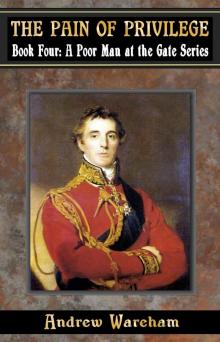 The Pain Of Privilege (A Poor Man at the Gate Series Book 4)
The Pain Of Privilege (A Poor Man at the Gate Series Book 4) Far Foreign (The Duty and Destiny Series, Book 9)
Far Foreign (The Duty and Destiny Series, Book 9) Shores of Barbary (The Duty and Destiny Series, Book 12)
Shores of Barbary (The Duty and Destiny Series, Book 12)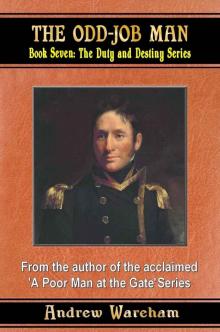 The Odd-Job Man (The Duty and Destiny Series, Book 7)
The Odd-Job Man (The Duty and Destiny Series, Book 7) Fire and Folly (Man of Conflict Series Book 3)
Fire and Folly (Man of Conflict Series Book 3) A Victorian Gent (The Making of a Man Series, Book 1)
A Victorian Gent (The Making of a Man Series, Book 1) Sugar and Spice (The Duty and Destiny Series, Book 6)
Sugar and Spice (The Duty and Destiny Series, Book 6) Dark Days Of Summer (Innocents At War Series, Book 4)
Dark Days Of Summer (Innocents At War Series, Book 4) Dire Shenanigans (The Making of a Man Series, Book 2)
Dire Shenanigans (The Making of a Man Series, Book 2) The Fuzzy-Wuzzy Man (The Duty and Destiny Series, Book 3)
The Fuzzy-Wuzzy Man (The Duty and Destiny Series, Book 3) Privilege Preserved (A Poor Man at the Gate Series Book 5)
Privilege Preserved (A Poor Man at the Gate Series Book 5) No Longer A Game (Innocents At War Series, Book 3)
No Longer A Game (Innocents At War Series, Book 3)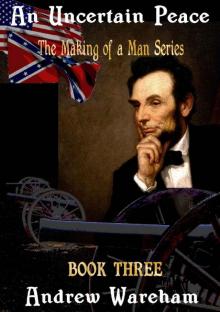 An Uncertain Peace (The Making of a Man Series, Book 3)
An Uncertain Peace (The Making of a Man Series, Book 3)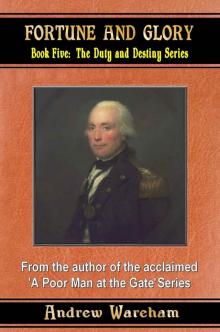 Fortune And Glory (The Duty and Destiny Series, Book 5)
Fortune And Glory (The Duty and Destiny Series, Book 5) The Old Order (A Poor Man at the Gate Series Book 7)
The Old Order (A Poor Man at the Gate Series Book 7) A Place Called Home (Cannibal Country Trilogy, Book 2)
A Place Called Home (Cannibal Country Trilogy, Book 2) Nouveau Riche (A Poor Man at the Gate Series, Book 2)
Nouveau Riche (A Poor Man at the Gate Series, Book 2) The Privateersman (A Poor Man at the Gate Series Book 1)
The Privateersman (A Poor Man at the Gate Series Book 1) Britannia’s Son (The Duty and Destiny Series, Book 4)
Britannia’s Son (The Duty and Destiny Series, Book 4) Long Way Place (Cannibal Country Trilogy, Book 1)
Long Way Place (Cannibal Country Trilogy, Book 1) Spanish Tricks (Man of Conflict Series, Book 5)
Spanish Tricks (Man of Conflict Series, Book 5) A Parade Of Virtue (A Poor Man At The Gate Series Book 9)
A Parade Of Virtue (A Poor Man At The Gate Series Book 9) A Busy Season (The Duty and Destiny Series, Book 8)
A Busy Season (The Duty and Destiny Series, Book 8) Billy Bacon and the Soldier Slaves (Colonial Warrior Series, Book 1)
Billy Bacon and the Soldier Slaves (Colonial Warrior Series, Book 1) Raging Rajahs (Man of Conflict Series, Book 2)
Raging Rajahs (Man of Conflict Series, Book 2)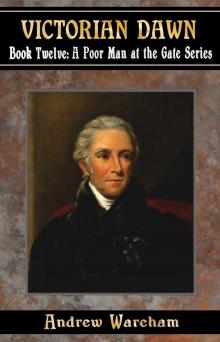 Victorian Dawn (A Poor Man at the Gate Series, Book 12)
Victorian Dawn (A Poor Man at the Gate Series, Book 12) Born To Privilege (A Poor Man at the Gate Series Book 3)
Born To Privilege (A Poor Man at the Gate Series Book 3) The Soldier Brat (Man of Conflict Series, Book 1)
The Soldier Brat (Man of Conflict Series, Book 1)